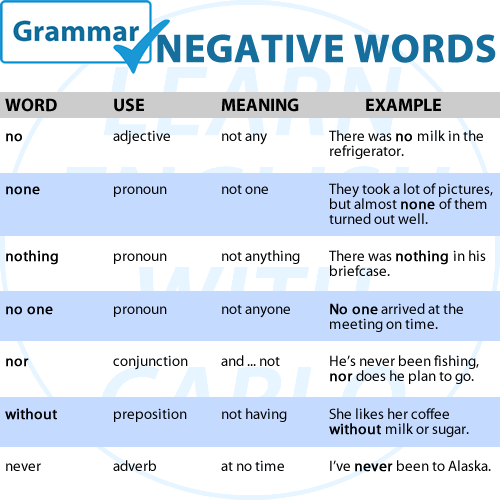🚫 No, none, nothing, no one, nor, without, never…
So many ways to say no! 😅
At first glance, these little words seem almost the same — they all express the idea of negation or absence. But in English, each one has its own special job in a sentence. Understanding how to use them correctly can make your speech and writing sound much more natural.
Let’s break them down one by one 👇
1. “No” – Means Zero of Something
We use no before a noun to mean not any or zero.
It’s often used to emphasize the complete absence of something.
✅ Examples:
- There’s no milk in the fridge.
- I have no idea what you mean.
- She has no friends in this city.
💡 Tip: You can often replace “no” with “not any.”
There’s not any milk in the fridge. → Same meaning!
2. “None” – Replaces a Noun
When you don’t want to repeat the noun, use none.
It stands alone and means not any or zero amount.
✅ Examples:
- How many apples are left? → None.
- I looked for my keys, but found none.
💡 Tip: “None” is used without a noun after it — it replaces the noun.
3. “Nothing” – Zero Things
Use nothing to mean “not anything.”
It’s a pronoun that refers to things — not people.
✅ Examples:
- There’s nothing in the box.
- He said nothing during the meeting.
🚫 Common mistake:
❌ I didn’t say anything. ✅ Correct.
❌ I didn’t say nothing. (double negative ❌)
4. “No One” – Zero People
When you want to talk about people, use no one (or “nobody”).
It means “not a single person.”
✅ Examples:
- No one called me last night.
- No one knows the answer.
💡 “No one” = “Nobody” = “Not anyone.”
But remember — “no one” is two words, not “noone”.
5. “Nor” – Connects Two Negative Ideas
Nor is often used after neither or another negative phrase.
It connects two negative ideas in a sentence.
✅ Examples:
- I don’t like tea, nor do I drink coffee.
- She’s neither angry nor disappointed.
💡 Think of “nor” as the negative partner of “or.”
6. “Without” – Absence of Something
Without is a preposition.
It means “not having” or “in the absence of.”
✅ Examples:
- I can’t live without music.
- He left without saying goodbye.
💡 It’s often followed by a noun or -ing verb.
without sugar, without saying, without sleeping…
7. “Never” – Not at Any Time
Never means not ever.
It shows that something hasn’t happened — and usually won’t.
✅ Examples:
- I’ve never been to Japan.
- He never listens to me.
💡 You can think of “never” as a stronger version of “not ever.”
Common Mistake: Double Negatives
In English, we don’t usually use two negatives together in one clause.
They cancel each other out or sound nonstandard.
❌ Incorrect: I don’t have no money.
✅ Correct: I don’t have any money.
✅ Also correct: I have no money.
✅ Quick Summary
| Word | Meaning | Example |
|---|---|---|
| No | Zero of something | No sugar in my coffee. |
| None | Not any (replaces noun) | None of the answers are correct. |
| Nothing | Not anything | There’s nothing to do here. |
| No one | Not a single person | No one came to the party. |
| Nor | Connects negatives | She doesn’t smoke, nor does she drink. |
| Without | Lacking something | I can’t live without you. |
| Never | Not at any time | I’ve never tried sushi. |

Final Tip
Practice these words in real sentences! Try writing examples about your daily life — for instance:
- “I can’t start my day without coffee.”
- “No one understands Mondays.”
- “There’s nothing better than a good nap.”
The more you use them, the more natural they’ll feel. 💬
